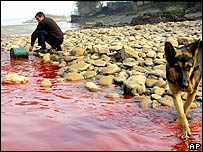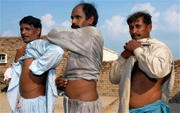
Immense ice shelf breaks off in Canadian Arctic: researchers
MONTREAL (AFP) - An enormous ice shelf broke away from Ellesmere Island in the Canadian Arctic last year, researchers said, warning it could be another symptom of global warming.
The 66-square-kilometer (25.5-square-mile) ice island tore away from Ellesmere, a huge strip of land in the Canadian Arctic close to Greenland.
The break occurred in August 2005 and was so violent that it caused tremors that were detected by Canadian seismographs 250 kilometers (155 miles) away, but at the time no one was able to pinpoint what had happened.
The Canadian Ice Service contacted geographer Luke Copland of the University of Ottawa, who reconstructed the chain of events by piecing together data from the seismic readings and satellite images provided by Canada and the United States.
"This loss is the biggest in 25 years, but it continues the loss that occurred within the last century," Copland told AFP, saying 90 percent of the the ice cover had been lost since the area was discovered in 1906.

















